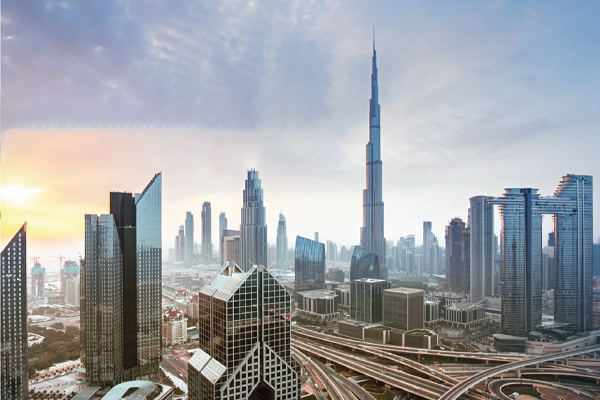 Dubai has rapidly emerged as a global leader in trade and logistics, capitalizing on its strategic location, world-class infrastructure, and favourable trade policies. This thriving city stands out as a pivotal hub connecting the East and West, providing efficient pathways for goods to travel by road, air, and sea. The logistics sector significantly contributes to about 14% of the UAE’s GDP—a figure poised for further growth.
Dubai has rapidly emerged as a global leader in trade and logistics, capitalizing on its strategic location, world-class infrastructure, and favourable trade policies. This thriving city stands out as a pivotal hub connecting the East and West, providing efficient pathways for goods to travel by road, air, and sea. The logistics sector significantly contributes to about 14% of the UAE’s GDP—a figure poised for further growth.
Dubai’s geographical positioning offers an unparalleled advantage for trade. Situated at the crossroads of major global trade routes, it serves as a central node for connecting markets across Asia, Europe, and Africa. This strategic location is complemented by an extensive network of interlinked highways, seaports, and airports that facilitate swift and cost-effective transportation of goods.
One notable example is the customs-bonded road connecting the Jebel Ali Port with Dubai World Central (DWC), streamlining cargo movement between the Al Maktoum International Airport and other transport hubs. The Jebel Ali Port, the largest in the Middle East and the 10th largest globally, exemplifies Dubai’s infrastructural prowess, with the capacity to handle 19.3 million Twenty-Foot Equivalent Units (TEU). This port serves as a gateway to key markets in the Indian subcontinent, Africa, and the Gulf, attracting numerous companies eager to leverage its connectivity.
Dubai’s role as a shipping hub is further reinforced by the operations of DP World, a logistics giant responsible for moving about 10% of global trade. By embracing cutting-edge technologies and innovative solutions, DP World enhances global supply chain efficiencies through its port-centric logistics services, maritime operations, and free trade zones. Their investment in Hyperloop technology—a revolutionary cargo transport system—highlights Dubai’s commitment to pioneering new methods for seamless goods movement.
Additionally, the government is heavily investing in the rapidly growing maritime industry segments of container logistics and dry bulk cargo handling. Such efforts underscore Dubai’s ambition to become a leading global shipping hub.
The development of free zones, such as the Jebel Ali Free Zone (Jafza), plays a crucial role in bolstering Dubai’s logistics capabilities. Jafza spans 3.85 million square meters, providing extensive warehouse and office spaces. Its unique sea-land-air logistics corridor enables swift cargo transitions between sea and air, bypassing customs checks. The recent inauguration of Maersk Kanoo UAE within Jafza underscores the zone’s strategic importance.
A key initiative enhancing Dubai’s logistics leadership is the World Logistics Passport (WLP). This groundbreaking freight loyalty program aims to eliminate trade barriers, optimize existing routes, and establish new ones, thereby strengthening global supply chains. As part of the Dubai Silk Road strategy, the WLP offers various operational and financial incentives, facilitating increased trade between emerging markets. Partner countries gain access to DP World’s global network of ports and economic parks, alongside Emirates Group’s Dnata and SkyCargo services.
Dubai International Airport ranks among the busiest worldwide, connecting the city to over 240 destinations. Meanwhile, Dubai World Central (DWC), positioned as the airport of the future, is set to handle over 160 million passengers and 12 million tonnes of cargo annually upon completion. Emirates SkyCargo, the airfreight division of the Emirates Group, is the world’s largest cargo airline, serving 50 dedicated freight locations and supporting global trade through its Emirates SkyCentral hub in Dubai.
With continuous investments in infrastructure, rail development, and expansion initiatives, Dubai’s logistics industry is poised for robust growth, driven by increasing foreign direct investment (FDI). As global trade opportunities expand, so will the demand for logistics and warehousing, further cementing Dubai’s status as a pivotal logistics hub.
Dubai’s commitment to innovation, strategic development, and international collaboration ensures its enduring role in serving the logistics needs of the world, making it a beacon of global trade and connectivity.